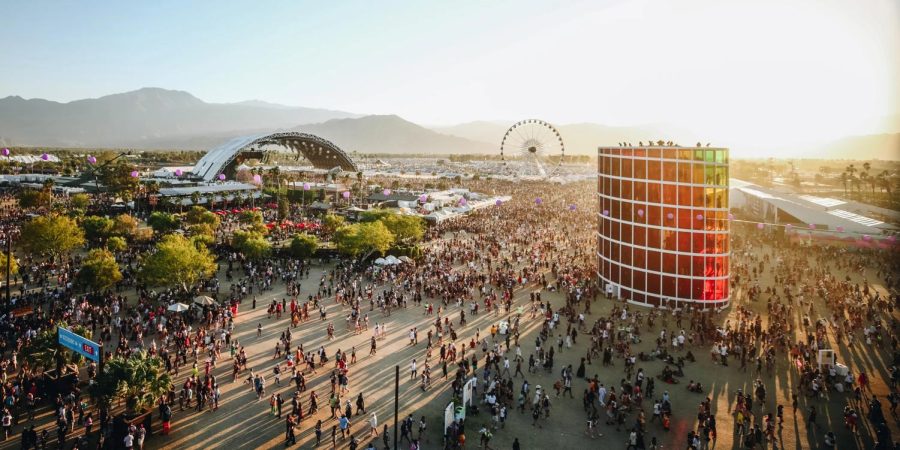Coachella Inaccessible, Influencers Run Amok
The Coachella Valley Music and Arts Festival will head into its second weekend of performances April 22.
Like many 2010s pop culture enthusiasts, I spent the majority of early high school waiting with bated breath for photos and videos of the Coachella Valley Music and Arts Festival to appear online. I loved the festival’s sheer extravagance, signified by the concert-goers’ absurd, Palm Springs-inappropriate outfits, the stylized Instagram posts taken against the backdrop of the event’s signature ferris wheel, and the unimaginable thrill of outrageous performances. This year, as my social media feeds were once again inundated with Coachella content, it seems like some of the elusive glamor has been lost. While I’ve spent years idolizing the artists and envying the fashion, this year I’m filled with a sense of mild disgust at the event’s propensity toward excess.
Although the festival still epitomizes Californian luxury, it seems wildly out of touch with contemporary America. Instead of an accessible weekend of music and fun, the festival now seems a little like the Capitol in The Hunger Games. Crowds of one-percenters stroll the grounds as performances are overshadowed by Fyre Festival-esque stories of poor planning, influencer invasion, and nauseating instances of overconsumption. The cost of a general admission ticket has soared to nearly $500 from $350 in 2014, a number which does not take into account the cost of housing, transportation, or food. This begs the question: does the future of music festivals include ordinary people?
Music festivals have always privileged celebrity clients, offering them entrance into VIP viewing areas and providing them special perks, but the A-list treatment at this year’s Coachella felt more pronounced than ever. In light of the tragedy at Travis Scott’s Astroworld Festival in Houston, Texas and the country’s ongoing struggle to mitigate the spread of COVID-19, crowd safety at music festivals seems especially important. Although there have been few health incidents at this year’s festival, campgrounds have flooded, water and shower lines are long and scarce, shade and seating are limited, and concerns over superspreading are rising. Most regular patrons swelter in the hot sun, as shaded spaces are overcrowded or only made available to VIP guests.
At RevolveFest, a desert party hosted near the festival’s grounds, partygoers expressed concern over the event’s lack of adequate transportation, food, and water. While celebrities like Kim Kardashian and Timothée Chalamet were ushered into shaded areas and given water, the majority of other guests were stranded in the heat. In some instances, influencers struggling to get on departing buses screamed things like, “Do you know who I am?” in order to secure a seat.
Although makeup artist and influencer James Charles has had a morally ambiguous career at best, he offered an interesting perspective on the nature of this year’s Coachella. For influencers, Charles explained, Coachella is about creating content, not enjoying the festival. While elite celebrities like Kendall Jenner and Hailey Bieber wore simple outfits and spent most of their time in VIP sections, influencers spent hours in elaborate hair and makeup after spending weeks preparing their outlandish festival looks.
“The fashion at Coachella has been a very controversial topic that I’m seeing a lot of different TikToks about: the differences between what influencers wore versus what celebrities wore, celebrities dressing casual making influencers look stupid,” Charles said in a recent TikTok. “A lot of celebrities dress casual because they don’t want to be spotted. They want to get into the festival, watch the set with a few of their friends. They don’t wanna post any content and they wanna get out and enjoy their day … Whereas a lot of influencers do want to get spotted … our entire lives and jobs revolve around creating content and getting engagement on that content. I would love to go to a music festival in a casual outfit, but if I posted it on Instagram, it would get zero engagement.”
While Charles’ argument makes sense for the niche group of people attending this year’s Coachella, it also casts the event as more of a professional social media convention rather than a music festival. Everything seems to be about posting and flaunting wealth. Do people who aren’t influencers or celebrities have a place at Coachella anymore?
The performances have been earth-shatteringly good — examples include Harry Styles bringing out Shania Twain for “Man! I Feel Like A Woman!” and Rico Nasty’s cameo during Doja Cat’s set — but they don’t seem to make up for the average concert-goer’s experience of ridiculously overpriced food, hour-long lines, and exclusive events. Although Coachella has long been heralded as one of the best music festivals in the world, I’m feeling doubtful that its prestige can withstand this year’s overindulgent, inaccessible culture.










